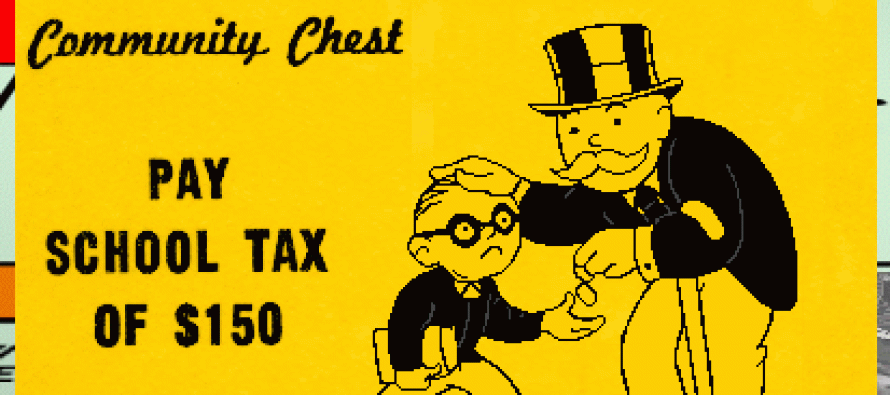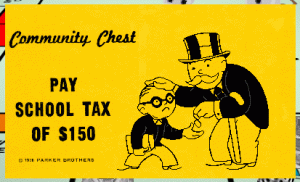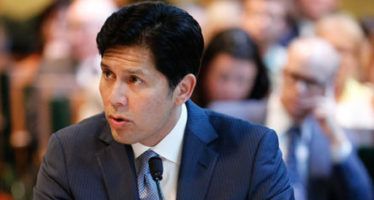Parcel tax change wouldn't help poor schools

 Does government need to grab more money for schools? One way to get it is to make it easier to pass local parcel taxes. So finds a new study from the Public Policy Institute of California. A parcel tax is charged to each “parcel” of land. So a $250 parcel tax would be the same for a home or a Costco store.
Does government need to grab more money for schools? One way to get it is to make it easier to pass local parcel taxes. So finds a new study from the Public Policy Institute of California. A parcel tax is charged to each “parcel” of land. So a $250 parcel tax would be the same for a home or a Costco store.
But the study found such a change wouldn't broaden the use of parcel taxers use beyond the mostly wealthy areas that currently use them.
“It is hard to say that lowering the vote threshold for parcel tax passage would expand their reach into new areas of the state or to more disadvantaged students,” co-author Eric McGhee said, according to the announcement of the study. “This change would likely make it easier for more of the same kind of districts to pass parcel taxes and for districts that already have them to pass more.”
The context is a potential state ballot initiative that would drop to 55 percent from two-thirds the threshold for passing local parcel taxes.
This would be similar to Proposition 39, which in 2000 reduced to 55 percent from two-thirds the threshold for passing local school construction bonds, paid for by tax increases. However, traditionally in California it has been easier to pass school bonds because the money is reserved for construction, not administration or pensions. Parcel tax money can be used for anything.
The new PPIC study also found the main aim of such a change on parcel taxes would not be to “expand their use beyond the sort of wealthy Bay Area school districts that already have them.” So the aim of cutting the threshold to 55 percent would be thwarted.
Fungibility
Dilbert's comic strip includes a humorous cartoon about how difficult it is for people to understand that in bureaucracies funding is fungible. According to the Merriam-Webster dictionary, “fungible” means:
“being of such a nature that one part or quantity may be replaced by another equal part or quantity in the satisfaction of an obligation
Parcel taxes add funds to the budgets of local school districts with no offset from the state funding formula for each school. Parcel taxes are additional, not subtractive.
The ballot proposal on the voter threshold for school parcel taxes wouldn't change that.
But there's another factor: Gov. Jerry Brown’s new “local control funding formula.” According to the website EdSource.org, this will mean as much as $3,000 per student extra for “low income children” in public schools. “Low Income” is defined as those students eligible for free and reduced-priced meals programs.
So the poorer local districts already will be getting more money, and wouldn't need whatever they might get from higher parcel taxes.
As the PPIC study correctly points out, lower-income school districts tend not to pass school parcel taxes. Conversely, most parcel taxes that have historically been approved by voters have been in wealthy communities mostly in Northern California. So this new school funding formula is mostly a shift in funds from Northern California to Southern California.
With this new funding formula, the most likely way to restore funds taken away from wealthier school districts would be through a local parcel tax. Thus, school parcel taxes approved in wealthier areas are fungible: they backfill funds shifted elsewhere.
Reversing Prop. 13
Lowering the voter threshold for school parcel taxes would result in reversing the effects of Proposition 13. In 1978, Prop. 13 forced a shift of school funding from local schools to statewide financing of public schools.
If a new ballot proposal lowering the voter percentage for parcel taxes passes, it would transfer the burden of taxation back to local school districts, at least for the wealthy ones. But the higher parcel tax rates also would increase the cost of owning a home in those areas, something that Prop. 13 was designed to prevent.
For now, making it easier to raise parcel taxes is just a proposal. But it's another example of how taxes are by definition fungible. Supposedly “protected” funds get raided all the time.
Related Articles
Secure Choice retirement program up against powerful federal law
An unprecedented state law meant to create 401(k)-style retirement accounts for millions of private-sector workers in California now faces a
Bill to create ‘segregated’ school discipline
June 1, 2012 Katy Grimes: With all of the recent talk about nanny states and politicians interjecting themselves into the
NRC leaves lump of coal in San Onofre’s stocking
The Nuclear Regulatory Commission this week cited Southern California Edison for failing to check the design of steam generators




